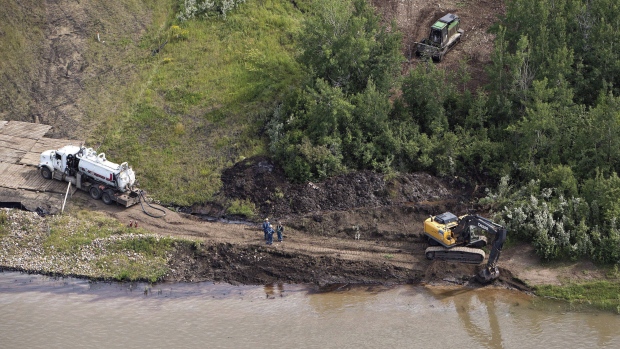Aug 3, 2016
Saskatchewan has never physically inspected Husky pipeline: Report
, Reuters

A Husky Energy Inc (HSE.TO) oil spill into a major Canadian river on July 20 was the third in the same area in eight months, government records showed, and could put new pressure on Saskatchewan's energy regulator to improve its monitoring of pipelines.
The economy ministry is the energy regulator in the western Canadian province and officials there told Reuters it has never physically inspected the 19-year-old Husky pipeline since it was constructed.
"In some ways, the oil industry in Saskatchewan has been given a free pass by the province," said Emily Eaton, a University of Regina professor who studies the energy industry.
"Pipelines seem to be a particularly under-regulated part of the industry."
The two earlier spills - in December 2015 and June 2016 near the North Saskatchewan River - have not previously been reported. And while government records show there are hundreds of small hazardous waste spills in Saskatchewan each year, oil spills from pipelines are not as frequent.
Over the last 12 months, 11 spills were reported and three were from Husky pipelines in the Lloydminster area, where the company operates the Saskatchewan Gathering System. Three others were from Penn West Petroleum Ltd pipelines near Kindersley.
Asked about the leaks, Husky said it takes every incident seriously, and is conducting a full investigation.
On Dec. 30, less than three gallons of oil spilt about six kilometers (3.7 miles) south of the North Saskatchewan River. On June 7, 53 gallons of oil spilt within a few hundred meters of the river, affecting about 100 square meters of ground but not reaching the water.
On July 20, more than 50,000 gallons of oil and diluent spilt, running into the river and forced two cities to shut down parts of their drinking water systems. Government records showed all three spills were reported within a five-kilometer radius.
In the past few years, the province's energy regulator has been criticized for doing too little to monitor operating pipelines.
A 2012 report from Saskatchewan's auditor found that while the economy ministry regulated the construction of new pipelines, it had "no documented processes to regulate existing pipelines."
In 2014, the auditor found that problem had not been fixed.
The economy ministry told the auditor in 2014 that it was planning to amend two laws, adding "more substantive provisions regarding pipeline integrity", but those changes have not been made. It has reorganized staff and developed new policies and procedures to guide their work.
Asked whether it had inspected the pipeline that failed, the regulator said it had not. The ministry said that because pipelines are underground, it is "most effective" to review company-submitted processes and test results.
Husky Energy conducts monthly tests with a device that travels through the pipeline looking for flaws, and inspects the pipeline every two years.
The Saskatchewan regulator has physically inspected other pipelines. In neighboring Alberta, the larger Alberta Energy Regulator said it regularly inspects pipelines across the province.
Asked whether it was fair to connect the Husky oil spills to weaknesses in the provinces' regulatory system identified in 2014, the economy ministry said it was too early to draw conclusions.
"Throughout the course of our review, we will further examine our regulatory practise," the ministry said. "Should the review identify any necessary changes, we will be prepared to act quickly to make those changes."




